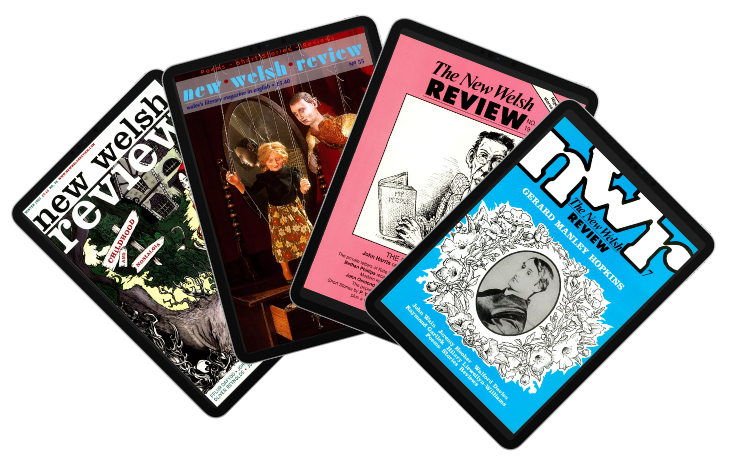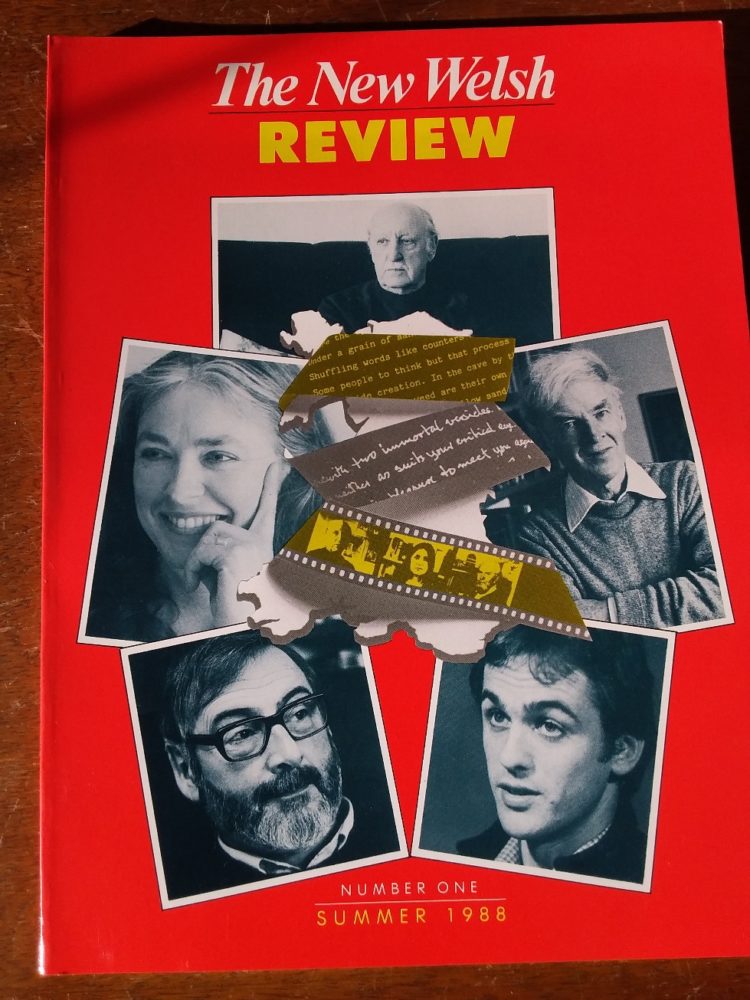On the threshold again – the New Welsh Review

Peter Finch
Despite government cuts and the Books Council’s periodicals cull the New Welsh Review is still with us. It’s been saved by adroit market manipulation from Parthian’s Richard Davies.
It’s slightly slimmer but still incisively edited by Gwen Davies. It remains well worth the asking price of £10 a copy too.
NWR emerged in 1988 as a replacement for the erudite and long-lived Anglo-Welsh Review. The digital future back then was yet to arrive and manuscripts still crossed the land wrapped in envelopes with postage stamps on the front.
It was a time when the funding bodies thought that out there among the vast untapped stretches of literate Wales were countless possible new subscribers.
All we had to do was somehow find them and then sign them up.

Editor New Welsh Review
Daunting
Magazines in line for funding were measured on how well they could accomplish this daunting task. Editors were seen putting impossible circulation figures on their funding applications and then getting it in the neck when, naturally, they completely failed to reach them.
The literary periodical audience was only so large despite what the Welsh Books Council mandarins then believed.
But the New Welsh Review did well.
Across one hundred and thirty-five issues and getting through seven editors its literary position remained unaltered. It stood for Wales, literature, and edge pushing; it was culturally aware, determined to sponsor the minority; it was definitively readable and, it has to be said, quite often hard to get hold of. Unless you subscribed.
I rarely saw it on sale at literary event bookstalls. Even contributors, paid a fee for their work, had to send in a cheque in order to access a hard copy.
Opinion
Magazines are important.
They expand opinion, they review the scene, they introduce new writers and celebrate old ones.
And since we cannot read everything produced in the Welsh world we need to have credible editors making a selection for us. Their choice is the one we follow.
When a new issue comes out it is an exciting literary moment.
Magazines should not be there for the benefit of their contributors. And there’s a danger all too often of that happening on the Welsh literary scene.
Magazines should go beyond by offering new poems to those who never write the things, finding the best new short fiction and giving it air, printing extracts from new and worthy novels, taking political positions and explaining them, offering essays on those culturally apposite things the Western Mail and other news outlets never do.
They should expand our collective intellectual horizons. The NWR does all these things.

Literary paradise
The entire archive of issues going back to Belinda Humphrey’s first number in 1988 is, thanks to Meic Stephens’ widow Ruth, now available online. It’s a literary paradise.
Digital subscriptions start at the amazingly low price of £18.
Issue #135, the first issue under the new regime with Parthian as publisher, has one of artist, the late William Brown’s bears on the cover.
Or maybe it’s a picture of a fighter jet. Hard to tell.
The image comes from one of Parthian’s forthcoming publications, Peter Wakelin’s book on the artist, Pursued by a Bear.
There’s more of Brown on the back and inside covers. It’s good to see his work available again.
The magazine moves through 2024 acutely aware of our contemporary concerns: JL George’s reflections on the role of neurodivergence in the writing of fiction; Claire Pickards’ review of how gay identity comes over in recent fiction and non-fiction titles, ‘Queer Old Codgers’. Philippa Holloway’s well-structured long short-story set on Crosby Beach pitching two pubescent schoolgirls among Antony Gormley’s rusting nude men.
Slatterday Shaw’s fiction where a young lad on the north Wales coast looses his virginity to an older woman.
There’s no poetry, not in this issue, although somewhere, if you delve, you’ll find the name of a poetry editor.
Engaging
To pull the reader in the issue opens with two bits of engaging journalism.
Marsha O’Mahony, an oral historian and researcher presents a fascinating slide across the Gwent Levels in an extract from her forthcoming Seren title This Stolen Land.
Here she uncovers Roman land draining, the one time Whitson zoo inland from Goldcliff and a whole flat and risky to live on sea-drenched landscape like nothing anywhere else in Wales.
Welsh music podcaster Neil Collins presents a slice his forthcoming music memoire of the 90s, International Velvet.
He describes how the Kinnock factor was instrumental in the way the anglophone world portrayed the soon to become world beating pop music of the period.
The early Manics were not immediately cool. ‘The Boyos are Back inn Town’, ‘This is spinal Taff’ and ‘Cymru Feel the Noize’.
Kinnock, you’ll recall, Britain’s next prime minister, fell over on camera on Brighton Beach, got portrayed by the Sun as the last lightbulb alight in 1992 Britain and then failed unaccountably to get elected.
Both of these extracts hit target in a way that Timothy Laurence Marsh’s piece on travel writing somehow doesn’t. Marsh’s essay makes the point that travel books should not always be completely trusted as often it transpires that the travel writer hasn’t actually visited the destination being described but just read about it.
Fair enough. But Marsh takes five long pages to say this.
Richard Lewis Davies, Mr Parthian himself, has the last word. It’s one of justification.
‘A culture that cannot reflect and discuss its place and time and products soon finds itself nowhere to go.’
Parthian are now helping sort that one. This is a magazine for readers not just writers.
Click the link on the website and subscribe now. Join the discussion.
Support our Nation today
For the price of a cup of coffee a month you can help us create an independent, not-for-profit, national news service for the people of Wales, by the people of Wales.






…’offering essays on those culturally apposite things the Western Mail and other news outlets never do.’ I agree with the sentiments and much of what Peter Finch has written. I wish New Welsh Review every success in its new iteration with the publisher Parthian. The audience/readership for NWR, however, is still and always will be miniscule and its ‘reach’, both politically and culturally, limited to Cymru and its coffee table literati. Review periodicals are not a ‘product’ that most people would want to ‘buy’ or even pay to subscribe to or for business to advertise in; so the NWR will… Read more »
I enjoyed Chris Jones’s view of a Welsh coffee table literati. I’ve been knocking around Wales and literature for a while now and I’ve never seen the New Welsh Review on a coffee table. I haven’t even seen many coffee tables. It’s more a kitchen sink literati. Parthian is trying to be commercial publisher but it’s a challenge and we need the support of the Books Council of Wales to make things balance. We have taken out an advert in the new edition of the New Welsh Review entitled Threshold and so have the publishers Calon (UWP), Seren and Honno… Read more »